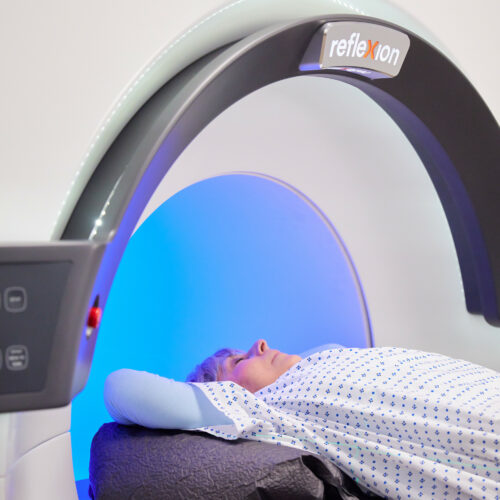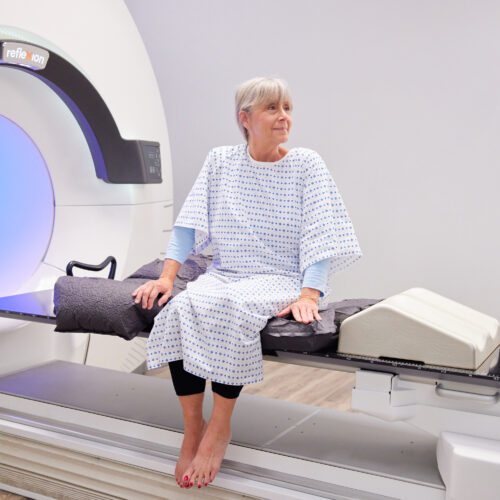
RefleXion Announces Newly Formed Scientific Advisory Board
October 19, 2021
Combined expertise in radiation oncology, medical oncology and nuclear medicine aims to expand patient treatment options
HAYWARD, Calif., Oct 19, 2021 – RefleXion Medical, a therapeutic oncology company pioneering biology-guided radiotherapy* (BgRT) as a new modality for treating all stages of cancer, today announced the formation of a 10-member Scientific Advisory Board (SAB). The new board brings together radiation oncology, medical oncology, and nuclear medicine to guide unique treatment approaches for patients with all stages of cancer with the RefleXionTM X1, a platform designed with multidisciplinary cancer care in mind.
“The composition of our new SAB mirrors the clinical versatility of our system and reflects the multidisciplinary teamwork that characterizes modern cancer treatment,” said Sean Shirvani, M.D. M.P.H., chief medical officer at RefleXion. “The board members will encourage rigorous thinking about the biology and treatment of advanced cancer with a breadth of clinical and technical knowledge that cuts across specialty boundaries and disease categories.
“These distinguished thought leaders bring impeccable research and clinical credentials to RefleXion’s overarching goal of improving the path forward for patients diagnosed with metastatic cancer,” continued Shirvani.
The founding members of the RefleXion Scientific Advisory Board are:
Radiation Oncology
- Dwight E. Heron, M.D., M.B.A. combines expertise from academia with managing large integrated oncology programs as system medical director for Oncology Services for Bon Secours Mercy Health System, and director of the Radiosurgery Institute at Mercy St. Elizabeth-Youngstown. He previously held clinical and academic tenures at University of Pittsburgh Medical Center. His research centers on PET/CT for staging and managing cancer, and stereotactic radiosurgery for brain, head and neck, lung, pancreas and liver tumors. He is president-elect of the American College of Radiation Oncology.
- Kristin Higgins, M.D. is an associate professor in the Department of Radiation Oncology at Winship Cancer Institute of Emory University, where she specializes in the treatment of thoracic malignancies. Her research work includes clinical trial development including novel radiation therapy and drug combinations. She leads clinical trials within NRG Oncology and is an international expert in the treatment of non-small cell lung cancer (NSCLC) and small cell lung cancer.
- Robert D. Timmerman, M.D. is professor of Radiation Oncology and Neurosurgery, interim chair of Radiation Oncology and Effie Marie Cain Distinguished Chair in Cancer Therapy Research at the University of Texas Southwestern Medical Center. After treating thousands of patients with brain tumors using highly potent and focused stereotactic radiotherapy, he helped pioneer translation of this approach to lung, liver, spine, breast, and prostate tumors as principal or co-investigator on prospective trials evaluating efficacy and toxicity of stereotactic ablative radiotherapy.
- Phuoc T. Tran, M.D., Ph.D., is a professor of Radiation Oncology and Molecular Radiation Sciences at Johns Hopkins University. He co-directs the Program in Cancer Invasion and Metastasis and has co-appointments in Medical Oncology, at the James Buchanan Brady Urological Institute and the Cellular and Molecular Medicine Program. His research focuses on tumor cell epithelial plasticity and novel agents to enhance the local and systemic effects of radiation.
- James Welsh, M.D. is a tenured professor and physician scientist at MD Anderson Cancer Center and is the director of the Immune Radiation program. His research centers on using radiation to turn the tumor into an “in-situ” vaccine to prime T cells, thus turning radiation into a systemic therapy. He specializes in checkpoint inhibitor resistance and has developed a novel way of using “low” dose radiation to overcome barriers of the tumor stroma to pull immune cells into solid tumors.
Medical Oncology
- John Heymach, M.D., Ph.D. is department chair of Thoracic/Head and Neck Medical Oncology at MD Anderson Cancer Center. His laboratory focuses on the mechanisms of therapeutic resistance to targeted agents, the regulation of angiogenesis in lung cancer, and developing biomarkers to select patients likely to benefit from targeted agents and immunotherapy.
- Jason Luke, M.D. is the director of the Cancer Immunotherapeutics Center at University of Pittsburgh Hillman Cancer Center and associate professor of Medicine at the University of Pittsburgh. Dr. Luke is an internationally recognized clinical and translational investigator in cancer drug development, particularly immunotherapy, and has been at the forefront of studying multi-site irradiation in combination with immuno-oncology combination therapies.
- Melinda Telli, M.D. is an associate professor of Medicine in the Division of Medical Oncology at Stanford University School of Medicine and director of the Breast Cancer Program at the Stanford Cancer Institute. Dr. Telli’s research focuses on developing novel therapies for the treatment of triple-negative and hereditary breast cancer.
Nuclear Medicine
- Chaitanya Divgi, M.D. is a nuclear oncologist with over 30 years of academic experience including tenures at Memorial Sloan Kettering Cancer Center, the University of Pennsylvania and Columbia University. He is a leader in the assessment of imaging (multi-modality and modality-agnostic) for developing cancer therapeutics and an expert in radiopharmaceutical production.
- Martin Pomper, M.D., Ph.D. is the Henry N. Wagner, Jr. M.D. professor, director of the Division of Nuclear Medicine and Molecular Imaging and associate dean for Entrepreneurship and Technology Development at Johns Hopkins Medical School. He is internationally known for developing new radiopharmaceuticals, including imaging and therapeutic agents targeting the prostate-specific membrane antigen. His research also includes developing new imaging agents for central nervous system disease and other disorders.
About RefleXion
RefleXion is a privately held commercial stage company developing the first biology-guided radiotherapy platform, a significant change in strategy from single tumor therapy to the ability to one day treat multiple tumors in the same treatment session in cancers that have metastasized. BgRT incorporates positron-emission tomography (PET) imaging data to enable tumors to continuously signal their location. The BgRT technology will synchronize these data with the linear accelerator to direct radiotherapy to tumors with sub-second latency.
*The RefleXion™ X1 is cleared for SBRT/SRS/IMRT treatments. BgRT is limited by U.S. law to Investigational use.
Media Contact
Amy Cook
acook@reflexion.com
925-200-2125




